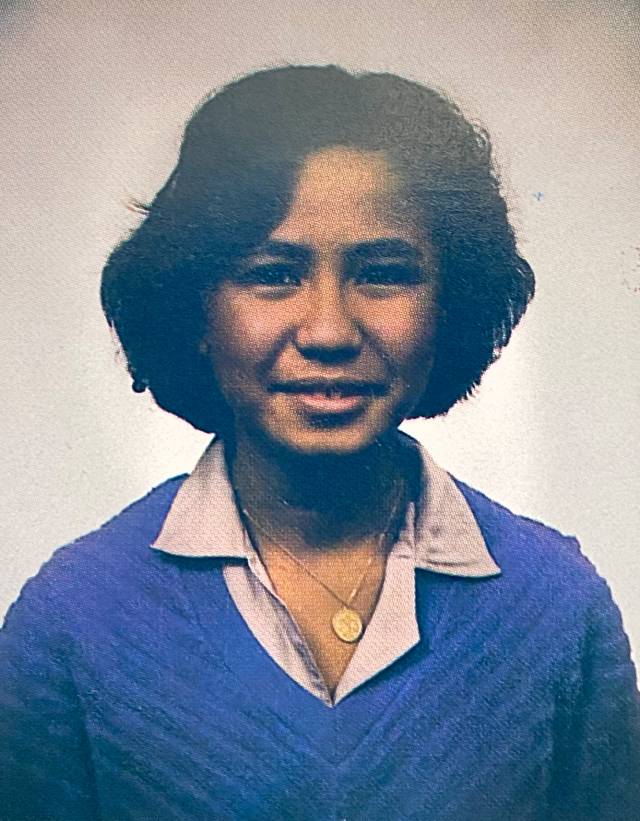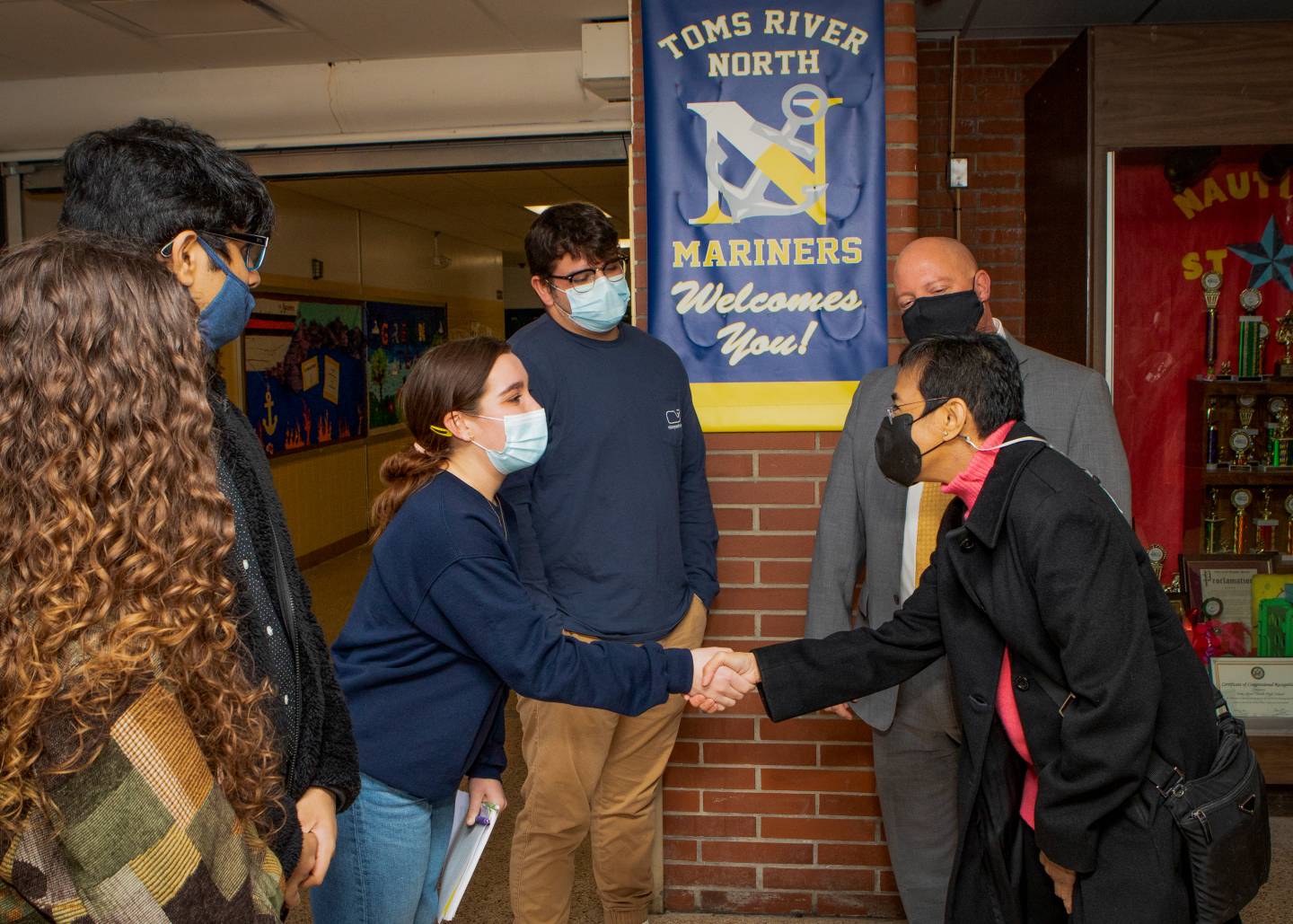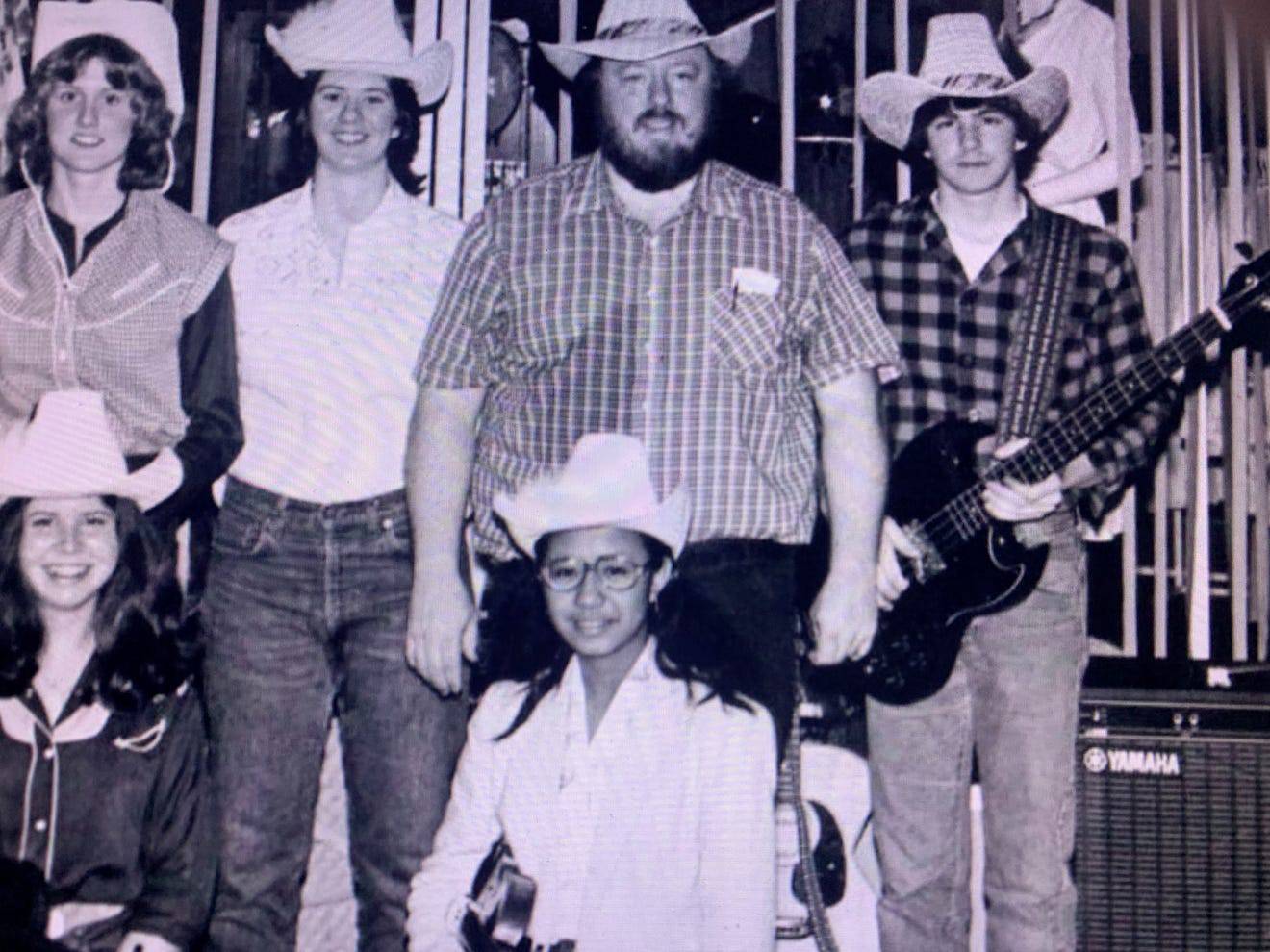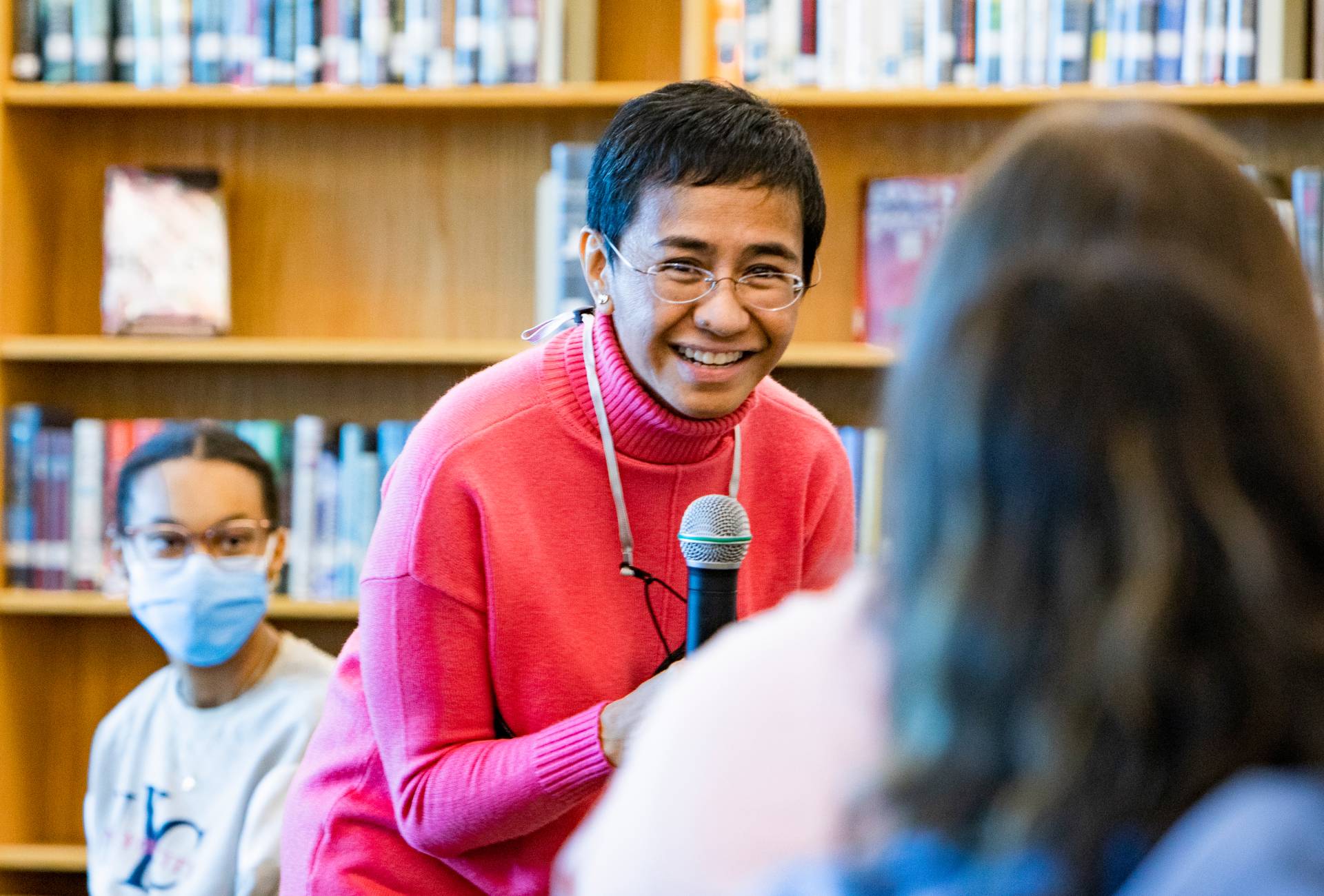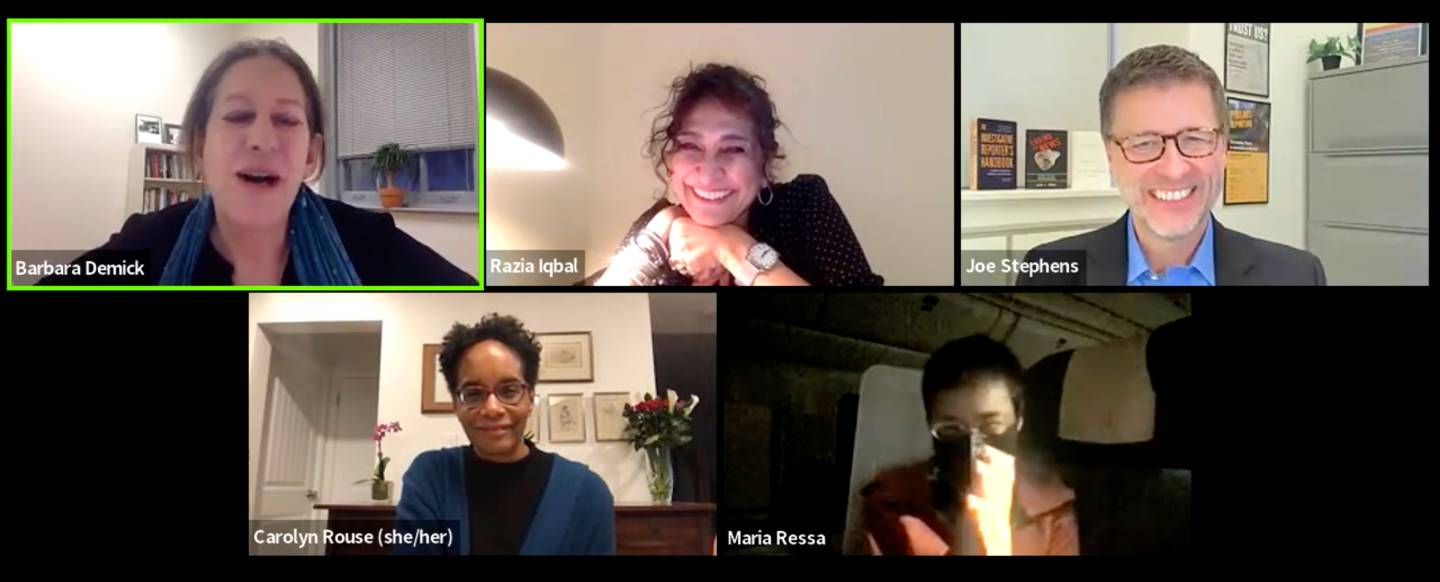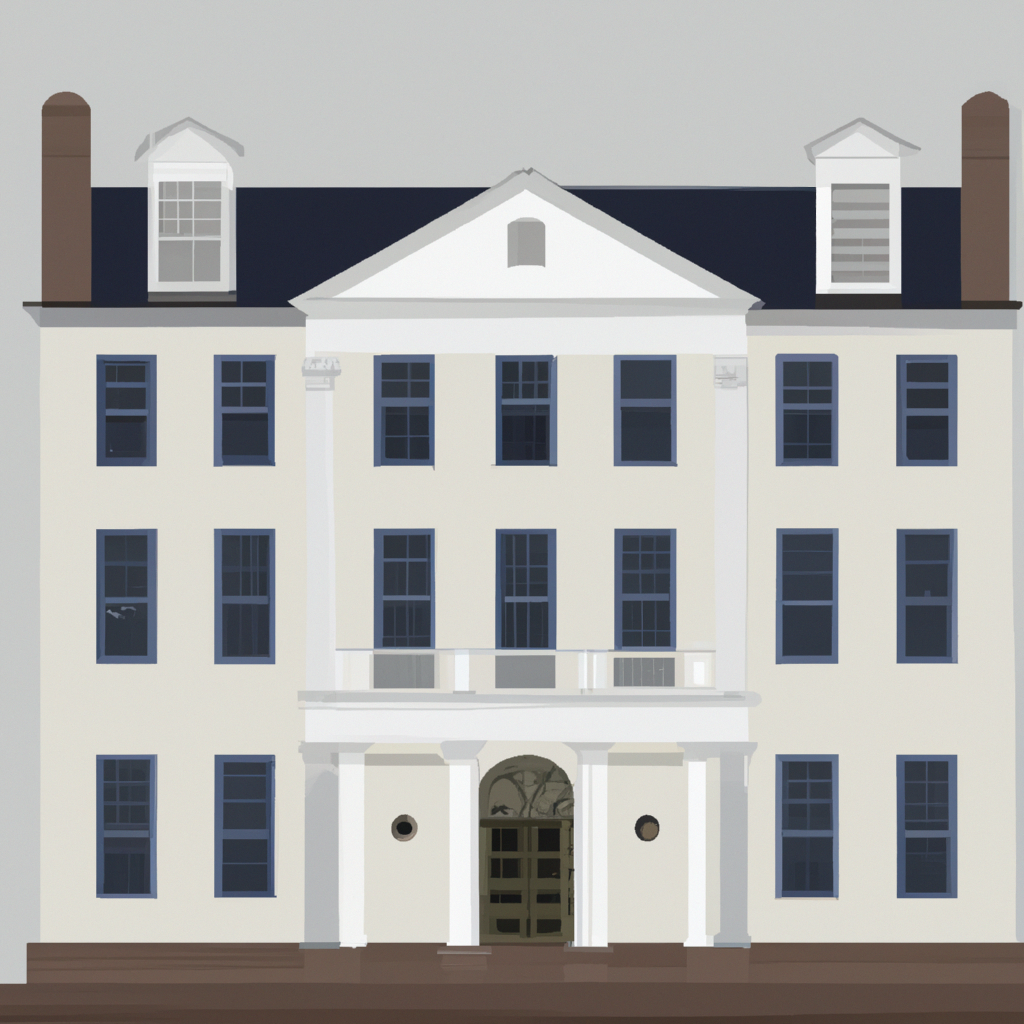Reading Time: 9 minutesVoted most likely to succeed in 1982, Filipino journalist Maria Ressa returned to Toms River High School North 40 years later on Friday, Feb. 18, as a Princeton graduate, TIME Person of the Year and 2021 Nobel Peace Prize laureate.
Maria Ressa from the Toms River High School North yearbook in the early 1980s. Ressa’s family immigrated from the Philippines to Toms River in 1973 when she was 10 years old. She said her experience in the public schools there taught her that “you can accomplish anything if you work hard enough.”
“Maria Ressa is the personification of what we want our students to be,” said Toms River North Principal Ed Keller.
Ressa, a 1986 Princeton alumnus, is co-founder of the Philippines-based online news organization Rappler.com. She received the Nobel Prize for her brave commitments to free expression, human dignity and democratic government in reporting on the authoritarian administration of Philippine President Rodrigo Duterte.
“We talk a lot about Maria Ressa in our journalism class,” said Katie Marra, editor of the school newspaper The Captain’s Log. “She risked her life and faced jail time using her voice to speak out against people who are doing wrong in the world.”
Ressa arrived at Toms River North late in the morning, straight from an overnight flight from the Philippines. She is in New Jersey to accept Princeton’s highest undergraduate alumni award at Princeton Alumni Day on Saturday, marking her first time in the U.S. since accepting the Nobel Prize in Oslo in December. Before the Alumni Day ceremony, Princeton’s Office of Communications worked with Keller to arrange Ressa’s visit to her old high school.
‘More than anything, I wanted to learn’
Ressa is greeted by Katie Marra as she arrives at Toms River High School North on Friday. Marra, editor of the student newspaper, said Ressa is a role model for journalists and an inspiration for all students at the high school.
Photo by
Denise Applewhite, Office of Communications
“Welcome home,” Keller said as Ressa walked through the lobby doors. She was greeted by students from class government, the school newspaper and the theater company, three of the many organizations in which Ressa participated when she attended Toms River North in the early 1980s.
Ressa then walked down the blue and yellow halls pointing to her old English classroom and the orchestra room where said she “lived” while she was a student there. In addition to playing multiple instruments in the orchestra, she was class president for three years, acted in school plays, and played basketball and softball.
“Toms River’s public school system gave me free music lessons, computer programming classes, Advanced Placement classes that allowed us to compete in Ivy League schools,” Ressa wrote on Rappler.com in 2019, “a future that promised you can accomplish anything if you work hard enough.” Her family moved to the town from the Philippines in 1973 when she was 10 years old.
Ressa spent most of her visit in the media center talking with about 100 students who represented various clubs and activities. She also toured the auditorium that will be named in her honor in May, following a petition of 2,000 students and approval by the Toms River Regional Schools Board of Education last fall.
“It is great to see that someone from our school could attend an institution like Princeton and go on to make such a big impact in the world,” said Dhruv Parikh, student council president. “It is inspirational and lets us students at Toms River North know we have a chance to make that impact.”
Ressa (seated in front) from a high school musical performance in the 1980s. Ressa was a three-time class president, played multiple instruments in the orchestra, and was involved in theater and athletics.
Photo courtesy of Asbury Park Press
After brief greetings and words of appreciation, Ressa turned her microphone to the students. Their questions ranged from her favorite high school activity, why she became a journalist, advice on applying to college, what inspires her, how she finds courage to fight against oppression, and how she adapted to life as a young immigrant.
“More than anything, I wanted to learn,” Ressa said, recalling how teachers helped her evolve from a shy child who barely spoke English to an outgoing and diligent student that ended up going to Princeton.
‘If you don’t fail at something, you haven’t tried enough’
On how to deal with challenges, Ressa said: “Never let something that you fail at stop you. In fact, if you don’t fail at something you haven’t tried enough.” She noted that Rappler.com was a startup that could have failed but is now marking its 10th year.
Ressa also talked about the moral compass that has guided her more than 30 years in journalism. She said Princeton’s Honor Code helps center her work. “The Honor Code is an example of the world I want to live in,” Ressa said. “You pledge on your honor to do the best you can, and then you also hold others accountable.”
Following the discussion, Ressa stayed to take photos with students who lined up to talk one-on-one with her. John Claude Yambao, a senior, said Ressa’s life reflects his background as a Toms River student who emigrated from the Philippines as a child. “My family was very excited that I would be meeting her today,” he said.
Ressa also connected with some of her high school classmates at the event. “You are famous around here!” Donna Garofalo-Muñiz, who now works as the senior guidance secretary, said as she gave Ressa a big hug.
To close the day full of warmth and fond memories, students presented Ressa with a sweatshirt embossed with the Toms River North mascot. “Once a Mariner, always a Mariner,” they proclaimed proudly.
Ressa answers questions from students who wanted to know about her favorite high school activity, why she became a journalist, what inspires her and how she finds courage to fight against oppression. Toms River North Principal Ed Keller said Ressa personifies what “we want our students to be.”
Photo by
Denise Applewhite, Office of Communications
A roadblock only makes her ‘more resolute to demand justice’
Ressa had originally been scheduled to arrive Wednesday evening, but those plans were temporarily put on hold after she received only six of seven necessary court approvals to travel.
The seventh court order, from the Philippine Court that is handling her appeal for a cyber libel conviction, eventually came through, but not before its delay threatened to derail her plans. Ressa filed an urgent motion for reconsideration to travel, which was granted during an emergency Zoom meeting, she said.
On her Twitter account Ressa wrote: “The randomness is a mind game, but it doesn’t defeat me. Makes me more resolute to demand justice.”
Rappler’s reporting on Duterte’s authoritarian administration has spurred repeated intimidation tactics by the Philippine government to discredit Ressa and the media outlet. She was convicted on the cyber libel charge in 2020 along with a former Rappler reporter.
After she was given permission to leave the Philippines for her Princeton trip, she followed up on her earlier tweet with another: “Lessons learned: hope is dangerous because it creates expectations, but life without hope means you become an automaton with no meaning or purpose. So it’s really a balancing act: be prepared for the worst, but keep taking risks to make your world the way it should be.”
Safeguarding speech, informing democracy
But Ressa didn’t wait for the plane’s touchdown to start her visit to Princeton.
Although she had to miss a Thursday luncheon on campus with New Jersey higher education communicators, she found a creative way to join the Thursday afternoon virtual panel discussion, “Reporting on Repressive Governments: How journalists overcome barriers to safeguard free speech and inform democracy,” hosted by Princeton’s Program in Journalism, the Office of Communications and the Department of Anthropology.
Just moments before the panel started at 4:30 p.m., Ben Chang, deputy vice president for communications and University spokesperson, received a text from Ressa: She would, indeed, be able to participate via Zoom on her phone — from the plane.
Joe Stephens, Ferris Professor of Journalism in Residence and director of the Program in Journalism, welcomed Ressa and the other panelists: Barbara Demick, visiting McGraw Professor of Writing, foreign correspondent and author; Razia Iqbal, visiting Ferris Professor of Journalism and anchor of the BBC’s Newshour; and Carolyn Rouse, Princeton’s Ritter Professor of Anthropology and department chair.
“I was ready to say how disappointed I was that Maria Ressa cannot be with us today so I’m very excited to tear up my remarks and start from scratch,” Stephens said with a wide smile.
He noted that the drama of the last 48 hours for Ressa “underscores why we’re here today and why it’s so important to look at how journalists are being treated and the power of hostile regimes around the world. Simply put, democracy is under siege.”
Ressa, whose trip to New Jersey was delayed by the Philippine courts, joined a Princeton journalism virtual panel on “Reporting on Repressive Governments” from her airplane seat. Clockwise from top left: Barbara Demick, visiting McGraw Professor of Writing, foreign correspondent and author; Razia Iqbal, visiting Ferris Professor of Journalism and anchor of the BBC’s Newshour; Joe Stephens, Ferris Professor of Journalism in Residence and director of the Program in Journalism; Ressa; and Carolyn Rouse, Princeton’s Ritter Professor of Anthropology and department chair.
How to stand up to a dictator
Kicking off the conversation, Stephens said to Ressa: “I hear you are writing a book, ‘How to Stand Up to a Dictator?’ [forthcoming from Penguin Books]. I would love to hear, how can we do that?”
Wearing a red zippered jacket and a black face mask that in no way hid her signature energy, Ressa jumped right in, her eyes beaming in the darkened plane.
“First of all, thank you, and I am so excited there is WiFi!” Ressa said. “I’m sorry I can’t do better with the lighting, but OK! It begins with values. I started [as a student] with [Princeton’s] honor code — the fact that in your area of influence, you pledge on your honor not to be corrupt, not to do the wrong thing, and if you see anyone else around you, that you report them. All of us here have standards and ethics. That is what not just journalism, but democracy means.”
Citing Harvard Business School Professor Emerita Shoshana Zuboff’s 2019 book “The Age of Surveillance Capitalism,” Ressa noted how algorithms determine what information reaches the widest audience.
“Since 2018, studies have shown that lies, laced with anger and hate, spread faster and further than facts,” she said. “If lies become facts, what happens? No facts, no truth, no trust. … if you have these conditions, no shared reality exists, no democracy can exist. That’s the descent to tyranny we are on globally.”
‘Let me make it very personal’
Ressa continued: “Let me make it very personal. I’m on a plane a day later than I should be. I have seen 10 arrest warrants in less than two years. This is my 36th year as a journalist. I have no control of my life.”
And yet, perenially undeterred, Ressa offered a call to action, leaning forward in her airplane seat with her guidance for standing up to dictators: “You hold the line! You don’t give up ground. You know what the constitution says.”
She continued: “The Philippine constitution is patterned after the U.S. Constitution. There is a bill of rights. So, that’s what we’ve been doing. But, man, it is exhausting!”
She also expressed gratitude and excitement about coming to Princeton. “It’s kind of like I’m forced to live moment by moment. You know what the good thing is? Man, you appreciate everything. Thank you, justices of the court of appeals!”
Clapping her hands together, she exclaimed: “Hey, I’m going to be on campus in a little while, so yay! That’s it. Don’t stop!”
‘Power to Maria Ressa!’
All the panelists had words of thanks and admiration for her.
Iqbal said unabashedly: “I am just going to fangirl, Maria. It is so amazing that you are going to get this [alumni] award and I just want to say, ‘Power to Maria Ressa!’”
Demick said, “People like Maria are a tribute to our perseverance.”
Rouse agreed, adding: “I want to thank Maria and all the journalists who write fearlessly. A free press is not debatable in a democracy.”
Calling Ressa “a role model for all journalists,” Stephens said the difficulty of the last 48 hours made her appearance even more meaningful. “It’s almost better this way, to have you just push through all the barriers and be on our screens providing us with your wisdom. And that goes for this entire panel of all-stars.”
Jill Dolan, dean of the college, the Annan Professor in English and professor of theater in the Lewis Center for the Arts, was among the viewers.
“I’ll never forget the image of Maria participating from her airplane seat, and making such vital, moving contributions to the discussion,” said Dolan, who is introducing Ressa at Alumni Day on Saturday. “It was wonderful to hear from women journalists who are so committed to everything that matters to democracy.”
Watch the full 90-minute panel discussion online.
Jamie Saxon and Denise Valenti contributed to this story.
.








